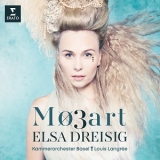Elsa Dreisig singt auf dieser reinen Mozart-CD ein Dutzend Rollen und kann eigentlich alle relativ glaubhaft charakterisieren. Den letzten gestalterischen Feinschliff aber sucht man vergebens, etwa die feinen textlichen Akzente oder auch die dramaturgische Artikulierung einer Schwarzkopf, die Präsenz einer Gruberova, die Differenzierung des Texts, wie ihn Lisa della Casa schaffte, die subtilen Ausdrucksnuancen einer Elisabeth Grümmer, oder die unmittelbar ansprechende Jugendlichkeit, die andere Sängerinnen als Cherubino und Zerlina gezeigt haben. Dennoch gibt es im Dreisigs Vortrag viel zu bewundern. Das Drama der Elettra-Arie aus Idomeneo kommt voll zum Ausdruck, und die Fiordiligi-Arie Come scoglio wird ganz hervorragend interpretiert. In Non mi dir, der Arie der Donna Anna aus Don Giovanni, hätte ich mir etwas mehr verhangen vorgetragenen Schmerz gewünscht, in Elviras Mi tradi mehr aufgestauten Zorn, in Despinas In Uomini etwas mehr Schalk.
Abgesehen von diesen kleinen Einschränkungen ist die CD, rein vokal gesehen, ein purer Genuss. Die satte Tiefe, die dunkel gefärbte Mittellage und die bruchlos erreichten Höhen zeigen einen stilistisch und musikalisch hervorragenden, perfekt ausgewogenen Gesang. Dazu kommt ein Timbre, das die Wirkung der Stimme wesentlich mitbestimmt.
Ein weiteres Atout dieser Produktion ist das von Louis Langrée inspiriert geleitete Kammerorchester Basel, das Teil des Bühnengeschehens wird, mit fein modelliertem und pointierten Spiel in den Rezitativen wie in den Arien.
Elsa Dreisig sings a dozen roles on this Mozart-only CD and can actually characterize all of them quite credibly. But one looks in vain for the final touches, such as the fine textual accents or the dramaturgical articulation of a Schwarzkopf, the presence of a Gruberova, the differentiation of the text as Lisa della Casa achieved, the subtle expressive nuances of Elisabeth Grümmer, or the immediately appealing youthfulness that other singers have shown as Cherubino and Zerlina. Still, there is much to admire in Dreisig’s performance. The drama of the Elettra aria from Idomeneo is fully expressed, and the Fiordiligi aria Come scoglio is superbly interpreted. In Non mi dir, Donna Anna’s aria from Don Giovanni, I would have liked a little more interiorized pain, in Elvira’s Mi tradi more pent-up anger, and in Despina’s In Uomini a little more roguishness.
Apart from these minor reservations, the CD is, from a purely vocal point of view, a pure delight. The rich depth, the darkly colored midrange, and the superb high register show a stylistically and musically excellent, perfectly balanced singing. In addition, there is a timbre that significantly contributes to the effect of the voice.
Another atout of this production is the Basel Chamber Orchestra, conducted with inspiration by Louis Langrée. It becomes part of the stage action, with finely shaped, playing in the recitatives as well as in the arias.
























